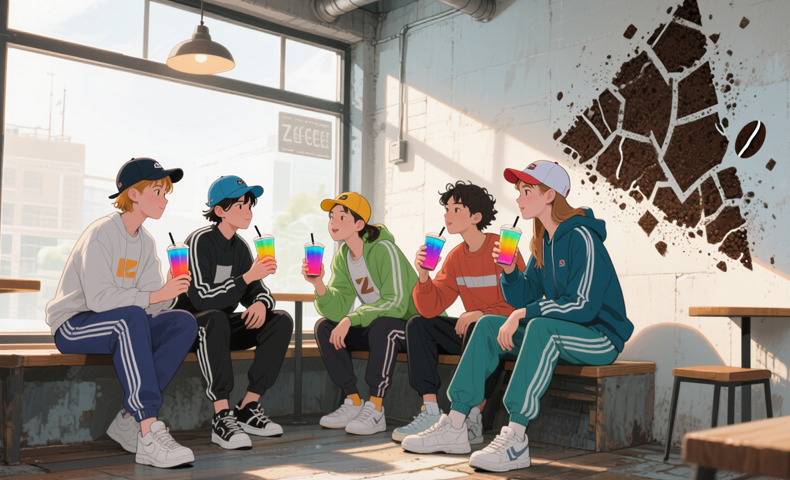How Are New Generations Shaping Coffee Trends?
The coffee industry is rapidly evolving, influenced by changing consumer preferences and shifting demographics. New generations, particularly millennials and Gen Z, are pushing boundaries with their preferences and expectations for coffee. From sustainability to digital innovation, these younger consumers are leading the way in defining modern coffee culture.
In this article, we explore how these generations are transforming coffee trends. We’ll delve into the influence of millennials and Gen Z, examining their demand for more sustainable, ethical, and innovative coffee experiences. These trends are reshaping the entire coffee landscape, from purchasing habits to product offerings.
As we move forward, it’s crucial to recognize the power of new generations in shaping the coffee industry. Understanding these shifts will help coffee brands stay ahead of the curve and build stronger connections with future consumers.

1. How Are New Generations Influencing Coffee Preferences?
New generations, especially millennials and Gen Z, are more informed and socially conscious. They prioritize ethical sourcing, sustainability, and transparency in their coffee choices. These younger consumers are not just buying coffee for the taste but also for the values behind the product. This shift in consumer behavior is forcing brands to rethink their offerings and adapt to these preferences.
Table: Key Coffee Preferences Among New Generations
| Preference | Millennials | Gen Z |
|---|---|---|
| Sustainability | High demand for eco-friendly products | Focus on sustainable sourcing |
| Ethical Sourcing | Preference for fair-trade coffee | Strong interest in supply chain transparency |
| Transparency in Brands | Seek brands with authentic missions | Look for brands with clear ethical guidelines |
2. What Are the Most Popular Coffee Trends Among Younger Generations?
New generations are influencing coffee trends in several key areas. Plant-based milk options, cold brews, and functional coffees are just a few of the innovations driven by millennials and Gen Z. The coffee industry is seeing a shift from traditional coffee offerings to more diverse, experimental drinks that cater to evolving tastes.

Table: Coffee Trends Popular with New Generations
| Trend | Explanation | Popular Among |
|---|---|---|
| Plant-Based Milks | The rise of oat, almond, and soy milk as alternatives | Gen Z, Millennials |
| Cold Brew | A preference for smoother, less acidic coffee | Both Millennials and Gen Z |
| Functional Coffees | Coffees with added benefits like CBD or adaptogens | Primarily Gen Z |
3. How Do Social Media and Online Communities Shape Coffee Choices?
Social media platforms play a significant role in how coffee trends are shared and discussed. Coffee influencers and online communities are pivotal in shaping new trends. Platforms like Instagram, YouTube, and TikTok have turned coffee drinking into a cultural statement, often driving younger consumers to experiment with new styles and flavors.
Table: Social Media Influence on Coffee Trends
| Platform | Impact on Coffee Culture | Example |
|---|---|---|
| Visual platform for sharing coffee experiences | Influencers showcasing unique coffee recipes | |
| TikTok | Quick, engaging videos that go viral, promoting new drinks | Viral trends like whipped coffee |
| YouTube | Coffee tutorials and reviews, influencing purchase decisions | Coffee influencers reviewing new coffee products |
4. What Role Does Sustainability Play in Coffee Purchases?
Sustainability is at the forefront of younger generations’ coffee choices. Gen Z and millennials are leading the charge in supporting eco-friendly coffee brands. They are willing to pay a premium for products that align with their values, such as those that prioritize sustainability in both packaging and sourcing.
Table: Sustainability Factors in Coffee Purchases
| Sustainability Factor | Importance for Millennials | Importance for Gen Z |
|---|---|---|
| Eco-friendly Packaging | High | Very High |
| Fair-Trade Certification | Important | Essential |
| Carbon Footprint Awareness | Growing Concern | Very High |
5. How Are Coffee Shops Adapting to New Generations?
Coffee shops are evolving to cater to the demands of younger consumers. Millennials and Gen Z are looking for more than just a cup of coffee; they seek an experience. Coffee shops are increasingly offering customizable drinks, creating unique atmospheres, and emphasizing social responsibility to appeal to this new generation of coffee drinkers.
Table: Coffee Shop Trends Catering to New Generations
| Trend | Impact | Example |
|---|---|---|
| Customizable Orders | Allows for greater personalization and variety | Coffee shops offering unique, customizable coffee drinks |
| Unique Coffee Experiences | Creating memorable, Instagram-worthy experiences | Coffee shops with immersive décor and Instagramable drinks |
| Sustainability in Cafes | Focus on reducing waste and using sustainable materials | Zero-waste coffee shops using compostable cups |
6. How Are Coffee Brands Leveraging Technology to Appeal to Younger Generations?
As younger generations are highly tech-savvy, coffee brands are incorporating technology into their business models to enhance customer experiences. Smart coffee machines, mobile ordering apps, and loyalty programs are just a few examples of how brands are catering to the digital-first mindset of these consumers.
Table: Technology Integration in Coffee Brands
| Technology | Benefit for Coffee Brands | Example |
|---|---|---|
| Mobile Ordering Apps | Convenience and speed for customers | Coffee brands offering app-based ordering and payments |
| Loyalty Programs | Encourages repeat purchases through rewards | Brands offering points or discounts via mobile apps |
| Smart Coffee Machines | Allows for precision brewing and better customer experience | High-tech coffee machines used in cafes to create customized drinks |
7. How Are Coffee Brands Addressing Health Trends Among Younger Generations?
Health-conscious coffee drinkers are becoming more prevalent, and coffee brands are responding by offering healthier options. Younger generations are increasingly seeking low-sugar, low-calorie, and even functional coffee drinks that offer added health benefits like antioxidants or protein.

Table: Health-Oriented Coffee Options
| Health Trend | Target Audience | Example |
|---|---|---|
| Low-Sugar Coffee Options | Health-conscious individuals, especially Gen Z | Coffee brands offering sugar-free or low-sugar alternatives |
| Protein-Infused Coffees | Active consumers seeking added nutrients | Protein coffee drinks for fitness-focused individuals |
| Antioxidant-Infused Coffees | Wellness-focused consumers looking for health benefits | Coffees with added superfoods like matcha or turmeric |
8. How Can Coffee Brands Maintain Relevance with Younger Generations?
To stay relevant, coffee brands must continually evolve to meet the needs and preferences of younger generations. Focusing on innovation, sustainability, and engagement through digital platforms will ensure that coffee brands remain in tune with the rapidly changing landscape of coffee consumption.
Table: Strategies for Coffee Brands to Stay Relevant
| Strategy | Benefit | Example |
|---|---|---|
| Constant Innovation | Keeps products fresh and exciting | Introducing new flavors or brewing techniques |
| Sustainable Practices | Builds trust and loyalty among eco-conscious consumers | Offering fair-trade and organic coffee |
| Digital Engagement | Creates stronger connections with younger audiences | Leveraging social media and apps to engage with customers |
9. How Are Coffee Trends Reflecting Broader Cultural Shifts?
Coffee is not just a beverage—it’s a cultural symbol. The way younger generations consume coffee is deeply intertwined with larger cultural shifts, such as sustainability, individualism, and the move toward a healthier lifestyle. Brands must recognize these cultural factors to remain aligned with their target audience.

Table: Cultural Shifts and Their Impact on Coffee Trends
| Cultural Shift | Impact on Coffee Trends | Example |
|---|---|---|
| Sustainability Focus | Increased demand for eco-friendly products | Rise in demand for recyclable coffee packaging |
| Health and Wellness | Shift toward healthier coffee options and functional drinks | Surge in popularity of plant-based coffee drinks |
10. Conclusion
The influence of new generations on coffee trends is undeniable. Millennials and Gen Z are reshaping the coffee industry, driving demand for sustainability, technology, and new coffee experiences. Coffee brands that adapt to these changes and stay connected to the values of younger consumers will continue to thrive in an ever-evolving market.
FAQ Section
Q1: What are the top trends influencing coffee preferences today?
Answer: Sustainability, plant-based milk options, and the growing demand for functional and low-sugar coffee drinks are some of the most significant trends driven by younger generations.
Q2: How do social media platforms impact coffee culture?
Answer: Social media platforms, especially Instagram and TikTok, play a key role in promoting new coffee trends, allowing younger consumers to share their experiences and influence others.
Q3: Why is sustainability so important for younger coffee drinkers?
Answer: Younger consumers prioritize ethical sourcing and eco-friendly practices, preferring brands that align with their values of environmental responsibility and social justice.
Q4: How can coffee brands engage with millennials and Gen Z effectively?
Answer: By focusing on personalized experiences, sustainable practices, and leveraging digital platforms like social media and mobile apps, coffee brands can effectively connect with younger consumers.
Q5: What are the future predictions for coffee trends among younger generations?
Answer: Future coffee trends are likely to continue focusing on health-conscious options, sustainability, and the integration of technology to enhance the coffee-drinking experience.
